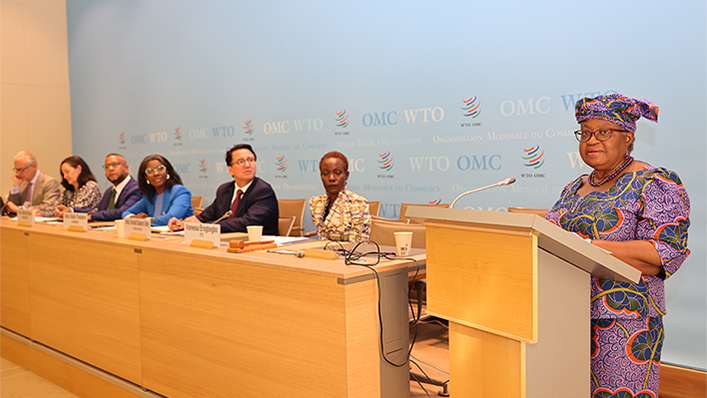
In her opening remarks, the DG said that understanding, and eliminating, the barriers holding women back from entrepreneurship and participation in international trade is urgent. “We must really unpack the solutions,” she stressed.
The DG noted that one-third of global businesses are owned, or led, by women, with women entrepreneurs mostly owning and leading micro enterprises. “One-third is a significant share of global companies, but it’s nowhere near parity with men-owned businesses,” she said. She stressed in particular the challenges facing women when they try to register businesses or access finance.
DG Okonjo-Iweala said: “Climate change is here, and we are already in a world where we are looking to technology and entrepreneurs to help find the way to navigate these changes and find more sustainable ways of living.”
The DG outlined some gender-biased misconceptions, such as the belief that women are less suitable for entrepreneurship, that they lack skills and the ability to innovate. “We must correct these thoughts and assertions by creating and making available to women-led trade enterprises the tools they need and appropriate responses, particularly regarding digital applications and trade finance,” she said.
Entitled “Women-led MSMEs, Trade and Climate Change — Adapting and Investing for the Future,” the workshop sought to offer a joint “solutions lab” to highlight the importance of addressing inclusivity in WTO discussions and rulemaking and underlining the link between sustainability and inclusivity.
The event kicked off with a round table that emphasised the importance of the three WTO groups working together to bring coherence to members’ work. The session highlighted examples of how women-led MSMEs are assisted at the national level, with a particular focus on indigenous people. The session brought together Matthew Wilson (Barbados), Coordinator of the WTO MSME Informal Working Group, Simon Manley (United Kingdom), Co-Chair of the WTO Informal Working Group on Trade and Gender, Nadia Theodore (Canada) and Ronald Saborío Soto (Costa Rica), Co-Chairs of TESSD, and Clare Kelly of New Zealand.
At a second panel, consisting of entrepreneurs, Amne Suedi Kagasheki, Founder and Managing Director of Shikana Investment and Advisory, and Rupa Ganguli, Founder and CEO of Inclusive Trade Ltd, shared the challenges that women-led small businesses face when trying to integrate environmental and social considerations into their business activities. They proposed changes that could help to overcome these challenges. Ms Kagasheki noted that social and environmental issues are increasingly becoming an important consideration and stressed the need for policy guidelines and legislation. Ms Ganguli noted the difficulty small businesses have in demonstrating their positive environmental impact. She presented the Verify for Impact tool she has developed to help address this issue.
Ivania Arguedas, of Costa Rican Foreign Trade Promoter (PROCOMER), explained how local platforms in Costa Rica assist women entrepreneurs by providing technical assistance, networking and finance opportunities to implement sustainable trade activities.
Share
Reach us to explore global export and import deals